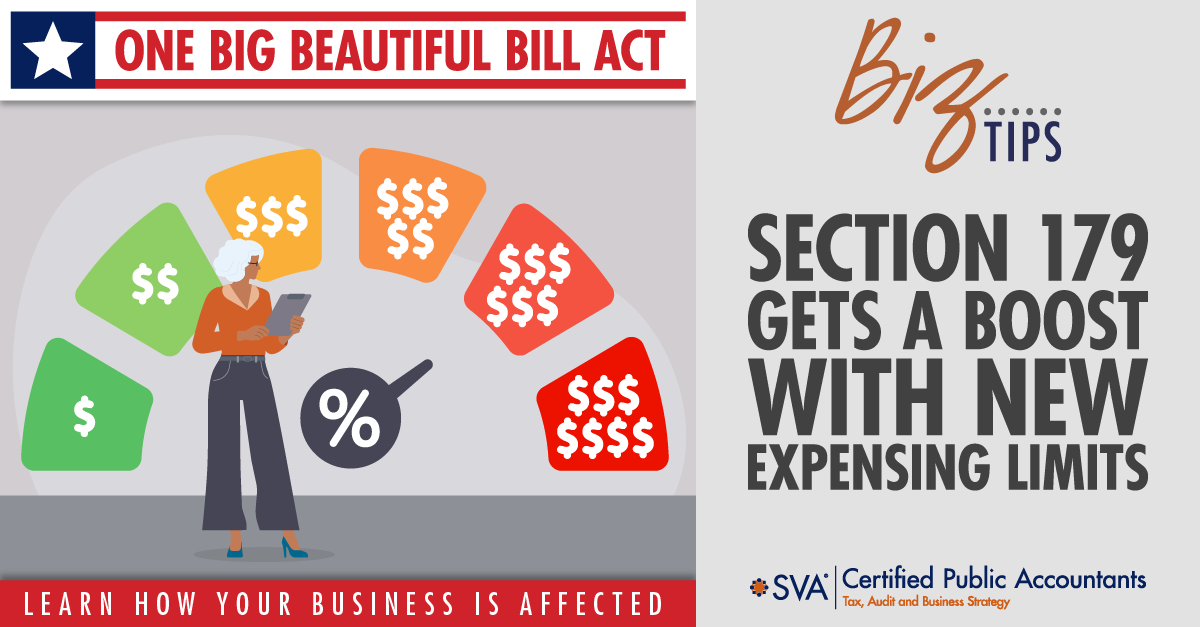| Highlights: |
- Summarizes how the One Big Beautiful Bill Act (OBBBA) dramatically increases Section 179 expensing limits for businesses starting in 2025.
- Explains that the maximum immediate deduction is raised to $2.5 million with a higher phase-out threshold, allowing larger purchases to be expensed upfront.
- Describes what qualifies as Section 179 property and the impact of these changes on small and midsize business tax planning.
- Notes the benefit of increased cash flow flexibility and incentives for capital investments in equipment, software, and other qualifying assets.
|
One of the most straightforward wins for small businesses in the One Big Beautiful Bill Act (OBBBA) is the expansion of Section 179 expensing. While not as headline-grabbing as some of the bill’s other provisions, this update delivers a meaningful tax benefit for businesses that invest in equipment and other qualifying property.
Here’s what’s changing, how it compares to previous rules, and why it may make a difference in your purchasing and tax planning decisions for 2025 and beyond.
(Download Video Transcript)
What Was the Rule Before?
Under the previous limits for the 2025 tax year, businesses could expense up to $1.25 million in qualifying property using Section 179. That limit began to phase out once total asset purchases exceeded $3.13 million, and the benefit was fully phased out at $4.38 million. These thresholds were indexed annually for inflation.
Section 179 applies to tangible, depreciable property like machinery, equipment, and software that is purchased and placed in service during the tax year. It has long been a popular provision for small and midsize businesses looking to recover the cost of asset purchases quickly.
What's New Under the OBBBA?
The OBBBA significantly enhances Section 179 for 2025 and future years:
- The maximum deduction limit is increased to $2.5 million.
- The phaseout threshold rises to $4 million, with the benefit fully phased out at $6.5 million.
- Both thresholds will continue to be adjusted for inflation annually.
- These changes apply retroactively to qualifying property placed in service on or after January 1, 2025.
This expansion doubles the amount of equipment or property a business can expense and raises the ceiling for which businesses are eligible to take the full deduction.
How This Helps Business Owners
This update may not change the type of assets you can expense, but it does expand how much you can write off immediately. And that’s a big deal.
Here’s what that means for you:
| Bigger Upfront Deductions |
The higher limit means larger purchases (or more of them) can be deducted in full rather than depreciated over time. |
| Easier Planning |
Since the change is effective for all of 2025, there’s no mid-year cutoff to worry about. It applies to anything placed in service throughout the year. |
| Cash Flow Flexibility |
Faster deductions can reduce taxable income, lower your tax bill, and leave more cash in the business to reinvest. |
This is especially helpful for businesses planning to upgrade their operations, whether that’s buying new equipment, investing in technology, or refreshing office space.
What You Should Do
There’s nothing new you need to file or opt into. The rules for qualifying property remain the same, it’s just the deduction limits that are changing.
That said, you may want to:
| Review Your 2025 Capital Expenditure Plans |
If you were holding off on a large purchase, you may now have more room to expense it fully. |
| Talk With Your Tax Advisor |
Discuss how these changes could affect your year-end tax strategy or budgeting decisions. |
| Explore Upgrades |
Whether it's automation tools, production equipment, or business vehicles, this could be the right year to move forward with investments you’ve been considering. |
Section 179: A Valuable Tool
Section 179 has always been a valuable tool for small business owners, and the OBBBA just made it even better. With higher limits and broader eligibility, this update supports growth by giving businesses more flexibility to invest when and where it makes sense.
Have questions about what qualifies for Section 179 or how these changes affect your plans? We’re here to help you think through the numbers and make the most of the new opportunities.
© 2025 SVA Certified Public Accountants

